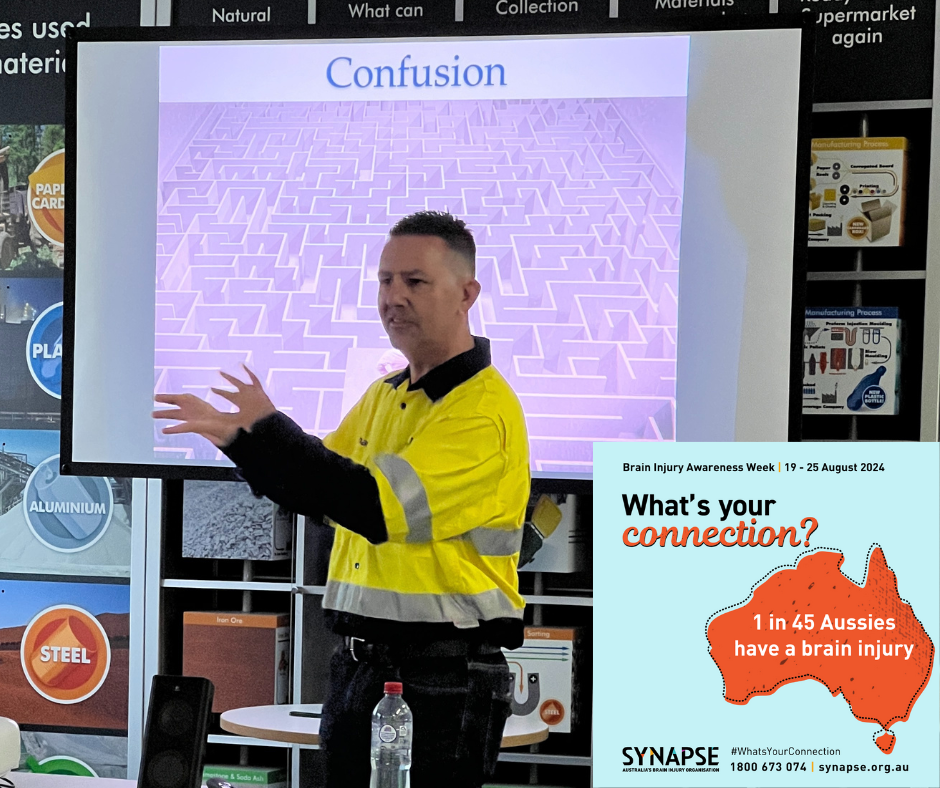By Michael Weston
Brain Injury Awareness Week is upon us again this year between the 19th – 25th August and I thought it would be worthwhile sharing a little bit about how I have learnt to live a happy life with an Acquired Brain Injury (ABI).
In 2013, I sustained a brain injury from a hypoxic/anoxia event, which is a loss of oxygen to the brain.
The 19th April 2024, marked 11 years since I sustained an ABI and was 9 years following the completion of a 2-year intensive rehabilitation program, which included Occupational Therapy, Speech Therapy, Psychology just to name a few. During these years, I have had many emotions and many setbacks but importantly I’ve experienced a greater amount of positive steps forward which outweighed the difficult times. This has been because of good people understanding who I am and these people being able to support me.
This year, I would like to raise awareness to the general community, the importance of having an open mind when we come across someone within the community or within a workplace that may appear to “not act like us”. Now I’m not going to be a hypocrite by saying I have never judged anyone that was a little bit “slow-off-the mark” for I have…but that was before I had sustained a brain injury. Was I narrow minded back then or was I not educated? I’m being honest here and will say a bit of both.
The fact of the matter is, we are all human and at times we will make many conscious and unconscious assumptions; however, we do need to take a step back when we come across a person that isn’t like us and rather than assume that the person is a little bit “slow-off-the-mark”, we need to show some humanity and empathy (not to be confused with pity). Best to wait patiently or ask the person if they would like a helping hand. Whatever the circumstance, provide support if you can without belittling them.
So after 11 years, whilst I have been able to rebuild neural pathways that allow me to function better than when I had first sustained my brain injury, I will never be as I was prior to my incident in 2013. To look at me out in the street, in a shop or talk to me, in many circumstances you may not see or hear anything different; however, there is a lot of work going on inside my brain in order to function as I once did. Then there is today, when I’m writing this and it has taken me over 2 hours to get 412 words down on paper. Yes, 2 hours. If I was working for an employer or I was serving you in a store you may make the assumption that I’m not invested in my job, I don’t want to be here working or I’m just “slow-off-the-mark”. In actual fact, I’m working harder than everyone else with my brain trying to put all the right pegs In all the right holes in order to function like everyone else. Now if I receive a judgmental verbal remark from a stranger that I need to “pull my finger out and get on with the job”, this changes my dynamics and ability to try my best. In fact it is quite traumatic to me to the point that I don’t have the same level of capability to function. Now that my brain has pretty much frozen, you’re looking at me as though I have an attitude. My ability to function has now been limited and my mental health is also affected.
My point is, we don’t always see a disability especially when it comes to brain injuries. Approximately 1 in 45 people in Australia live with some level of brain injury which is relatively high when you think about it. So the next time you come across a person you don’t know that appears to not be functioning as we may expect in society as being “normal”, remember that there are many people like myself trying their absolute best to function just in that moment. Not on that day, not in that week or month, that very moment. You can be part of the solution today by not assuming, be patient and ask if that person would like some assistance. Whenever I receive this non-verbal or verbal support, my functioning capabilities increase 3-fold as does my mental health.
So this week and everyday going forward, let’s think of those that live with brain injuries and how we can support them.




